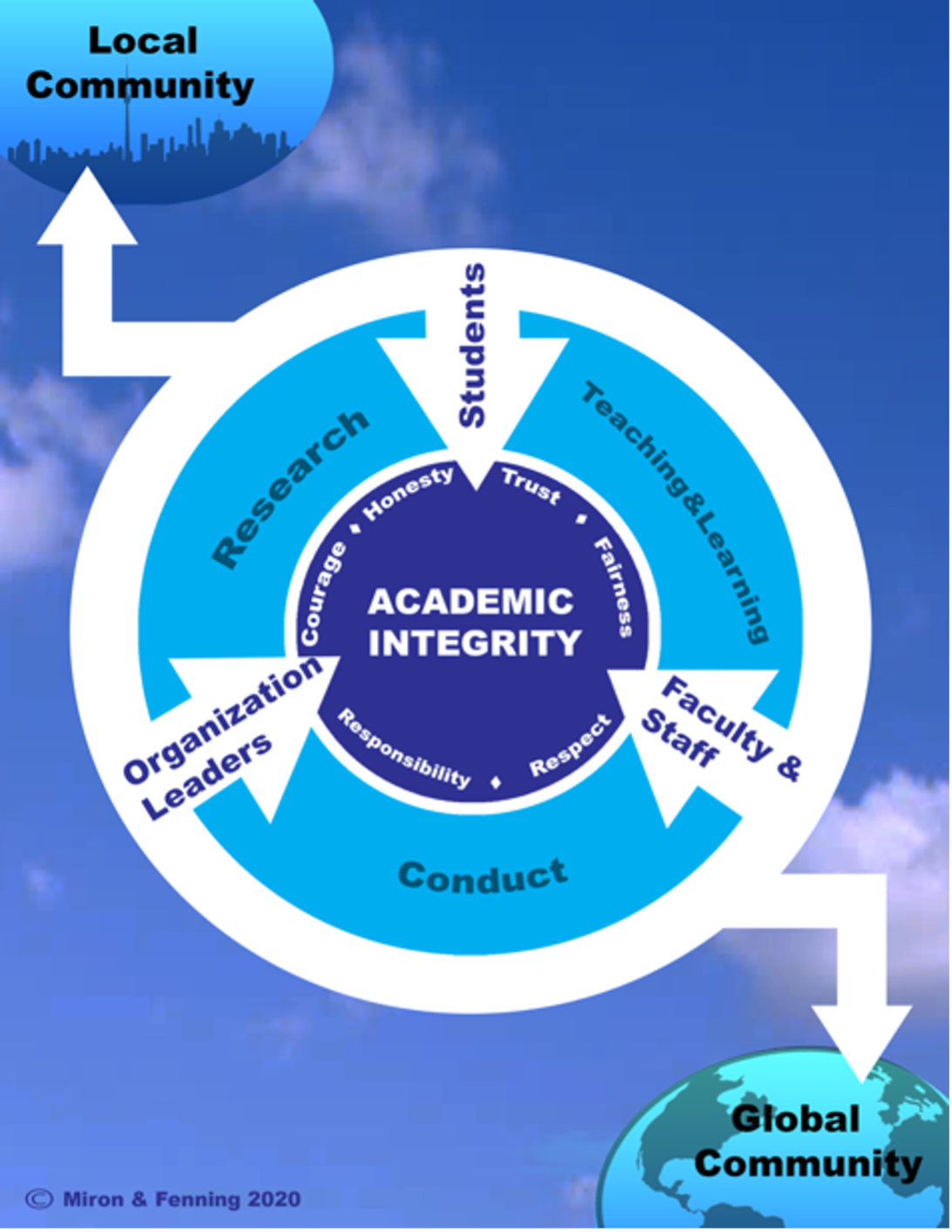Abstract
Rapid and necessary changes to the delivery of education in the post-secondary setting during CoVID challenged our traditional ways of thinking, being, and doing within higher education. Responsibilities to ensure quality educational offerings included the need to ensure the integrity of our efforts. Preserving and promoting academic integrity during these uncertain times were challenging and required a focused, thoughtful, and deliberate shared approach. One faculty within a large urban Canadian post-secondary setting set out to strategically plan efforts that would support and promote integrity within their faculty of health sciences and wellness. A framework created by one of the authors served to anchor the discussions and planning. Lessons from this work are important to understand and share and could offer other higher educational organizations suggestions for similar work.
References
Amzalag, M., Shapira, N., & Dolev, N. (2022). Two sides of the coin: Lack of academic integrity in exams during the corona pandemic, students’, and lecturers’ perceptions. Journal of Academic Ethics, 20(2). 243-263. https://doi.org/10.1007/s10805-02109413-5
Bertram Gallant, T., & Drinan, P. (2008). Toward a model of academic integrity institutionalization: Informing practice in postsecondary education. Canadian Journal of Higher Education, 38(2), 25-43.
Comas-Forgas, R., Lancaster, T., Calvo-Sastre, A., & Sureda-Negre, J. (2021). Exam cheating and academic integrity breaches during the COVI-19 pandemic: An analysis of internet search activity in Spain. Helyon, 7(10), e08233.
Cullen, C. (2021, August 3). Bracing for continued increased cases.International Centre for Academic Integrity. https://academicintegrity.org/blog/70-2021/august-2021/283-bracing-for-continued-increased-cases
Dodik, J., & Triadi Agung, S. & Taugiqi, R. (2021). Fraud triangle misuse of information technology and student integrity toward the academic cheating of UM student during the pandemic Covid-19. Research in Business & Social Science, 10(6), 329-339.
Eury, J. L., & Trevino, L. K. (2019). Building a culture of honor and integrity in a business school. Journal of Management Education, 43(5), 484-508. https://doi.org/10.1177/1052562919850223
Gamage, K., de Silva, E., & Gunawardhana, N. (2020). Online delivery and assessment during COVID-19: Safeguarding academic integrity. Education Sciences, 10(301), 1-24. 10, 301; doi:10.3390/educsci10110301
Goldberg, D. (2021). Programming in a pandemic: Attaining academic integrity in online coding courses. Communications of the Associations for Information Systems, 48, 46-53. https://doi.org/10.17705/ICAIS.04807
Guerrero-Dib, J., Portales, L., & Heredia-Escorza, Y. (2020). Impact of academic integrity on workplace ethical behaviour. International Journal for Educational Integrity, 16(2), 1-18. https://doi.org/10.1007/s40979-020-0051-3
Ikram, F., & Rabbani, M. (2021). Academic integrity in traditional vs online undergraduate medical education amidst COVID-19 pandemic. Cureus, 13(3). E13911.
International Center for Academic Integrity. (2021). Fundamental values of academic integrity. https://academicintegrity.org/resources/fundamental-values
Lancaster, T., & Cotarlan, C. (2021). Contract cheating by STEM students through a file sharing website: A Covid-19 pandemic perspective. International Journal for Educational Integrity, 17(3), 1-16. Doi.org/10.1007/s40979-021-00070-0
McCabe, D. L., Butterfield, K. D., & Treviño, L. K. (2012). Cheating in college: Why students do it and what educators can do about it. Johns Hopkins University Press. https://ebookcentral-proquest-com.ezproxy.humber.ca/lib/humber/detail.action?docID=3318632
Miron, J., (2016). Academic integrity and senior nursing undergraduate clinical practice [Unpublished doctoral dissertation]. Queen’s University.
Prins, S., & Lathrop, A. H. (2014).Institutional strategies that foster academic integrity: A faculty-based case study. Collected Essays on Learning and Teaching, 7(1), 32. https://doi.org/10.22329/celt.v7i1.3998
Reedy, A., Pfitzner, D., Rook, L., & Ellis, L. (2021). Responding to the COVID-19 emergency: Student and academic staff perceptions of academic integrity in the transition to online exams at three Australian universities. Int J Educ Integr 17(9), 1-32. https://doi.org/10.1007/s40979-021-00075-9
Sands, T., & Shushok, F. (2020, October 16). The COVID-19 higher education shove. EDUCASE review. https://er.educause.edu/blogs/2020/10/the-covid-19-higher-education-shove
Steinberger, P., Eshet, Y. & Grinautsky, K. (2021). No anxious student is left behind: Statistics anxiety, personality traits, and academic dishonesty—Lessons from COVID 19. Sustainability, 13(4762), 1-18. https://doi.org/10.3390/su13094762
Verhoef, A. H., & Coetser, Y. M. (2021). Academic integrity of university students during emergency move online assessment: An exploration of student voices. Transformation in Higher Education, 6(4), e1-e12. https://doi.org/10.4102/the.v6i0.132

This work is licensed under a Creative Commons Attribution-NonCommercial-NoDerivatives 4.0 International License.

